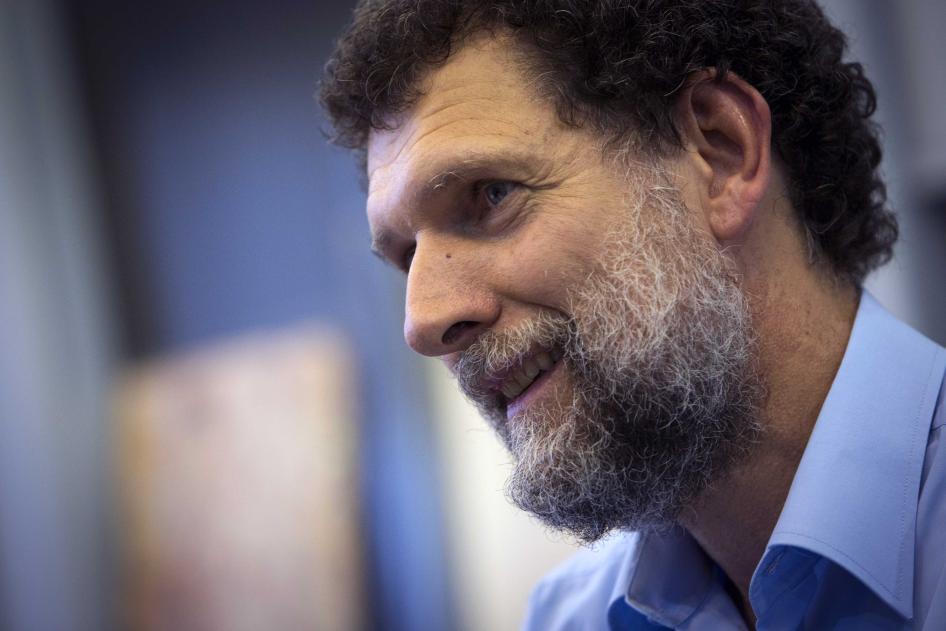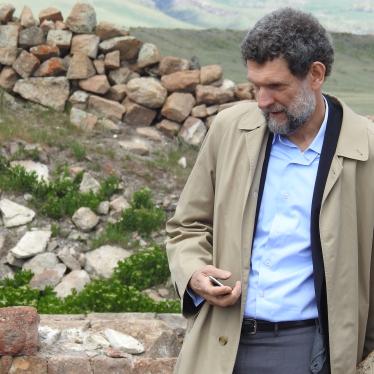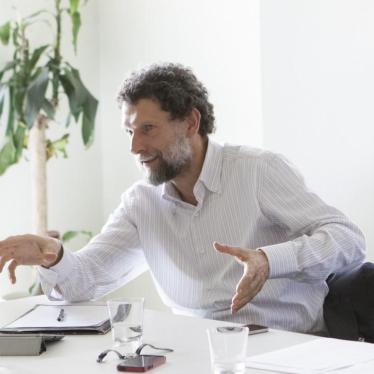(Istanbul) – A new bogus indictment against human rights defender and businessman, Osman Kavala, and US academic, Henri Barkey, for allegedly spying and attempting to overthrow Turkey’s constitutional order is politically motivated and bereft of legal credibility, Human Rights Watch and the International Commission of Jurists said today. The indictment, alleging the two were involved in the July 15, 2016, attempted military coup, demonstrates Turkey’s blatant refusal to abide by a European Court of Human Rights judgment, finalized in May 2020, which ordered Kavala’s release, and not only prolongs ongoing violations of his rights but gives rise to new ones.
An Istanbul court on October 8 accepted the indictment and has scheduled a first trial hearing against Kavala, who was been in Istanbul’s Silivri Prison since November 2017, and Barkey, who lives in the US, for December 18.
“The new case against Osman Kavala and Henri Barkey demonstrates the Turkish authorities’ flagrant misuse of the courts for political ends and their fundamental disregard for the basic principles of criminal justice,” said Hugh Williamson, Europe and Central Asia director at Human Rights Watch. “Defying the European Court of Human Rights order to release Kavala has confirmed the Court’s conclusion that Turkey is using detention and prosecution to silence a human rights defender.”
The 64-page prosecutor’s indictment, dated September 28, accuses Kavala and Barkey of “securing for purposes of political or military espionage information that should be kept confidential for reasons relating to the security or domestic or foreign policy interests of the state” (under Turkish Penal Code article 328), punishable with up to 20 years in prison, and “attempting through force and violence to overthrow the constitutional order of the Republic of Turkey or introduce a different order or prevent this order” (article 309), punishable with life in prison without parole.
The indictment recycles unsubstantiated accusations, which previously circulated in the pro-government Turkish media, that Kavala and Barkey were involved in espionage and in the 2016 attempted military coup. The indictment provides no credible evidence linking them with any criminal activities. (Further details about the content of the indictment are provided below.)
In a December 2019 judgment, which became final on May 11, the European Court of Human Rights ruled that the evidence on which Kavala was detained for the Gezi protests and the 2016 coup attempt was insufficient and agreed that Kavala’s detention and the charges against him “pursued an ulterior purpose, namely to silence him as a human rights defender.” On September 3, the Council of Europe Committee of Ministers, acting in its supervisory capacity for the implementation of European Court judgments, issued a decision ordering the Turkish government to ensure Kavala’s release, pointing to “a strong presumption that his current detention is a continuation of the violations found by the Court.”
On September 29, pro-government media reported that the Istanbul prosecutor’s office had prepared the new indictment against Kavala and Barkey. On the same day, Turkey’s Constitutional Court postponed its review of Kavala’s application regarding the legality of his continuing detention, which had been scheduled for that day.
On October 1, the Council of Europe Committee of Ministers issued a second decision calling on Turkey to ensure Kavala’s immediate release, expressing “deep concern that the applicant has still not been released” and announcing that an interim resolution would be issued at the Committee of Ministers’ December 1-3 session if Kavala had not yet been released.
“Turkey is bound by the ruling from European Court to free Kavala immediately, and the ruling covers his detention under the latest case against him,” said Roisin Pillay, director of the ICJ Europe and Central Asia Programme. “The new indictment presents no new grounds to justify his detention, and it is imperative that Turkey ends the persecution campaign against him by releasing him and dropping all charges.”
Indictment against Osman Kavala and Henri Barkey
A repetitive and rambling document, the indictment makes a series of wild assertions about the defendants and offers opinions on their activities but presents no evidence on which to ground a criminal prosecution. The indictment is devoid of details of any information the two obtained that could have constituted spying, as well as where, when, and for what purpose they obtained it, and how they were involved in the coup attempt. The prosecutor cites witness statements, police reports, data from cell phone base receiver stations, wiretap records, travel records, and open-source data as evidence but in fact the information purportedly provided by these sources carries no probative weight as evidence of the alleged offenses.
For example, the prosecutor provides no evidence that Kavala and Barkey ever met directly beyond an encounter in a restaurant on July 18, 2016, which both say was a brief exchange of greetings since each was having dinner separately with different people. In the absence of any evidence of meetings, the prosecutor relies on cell phone signal records from the same base receiver stations that indicate on twelve different dates over three years that Kavala and Barkey were present, along with thousands of other people, in central Istanbul locations at the same time. The implausible explanation of why there is no actual evidence of meetings or direct communication is that “Henri Jak Barkey knew about and implemented intelligence tactics and methods and they were especially careful on this matter.”
The prosecutor lists details of travel by the defendants and other people mentioned at different times to different places but presents no evidence that they knew about each other’s movements or that their travel demonstrates that they acted in coordination for a criminal purpose. The prosecutor repeatedly asserts that such information is significant without demonstrating what its significance might be and how it could be relevant to an investigation into espionage or the July 15 coup attempt.
Throughout the entire indictment, the prosecutor fails to provide any causal relation between the information provided and the crimes with which Kavala and Barkey are charged. Long sections of the text describing the Gezi protests and a chronology of incidents that occurred before and during the July 15 coup attempt in which neither defendant is mentioned, fail to demonstrate the relevance of this information to the case against the two but do corroborate that the Turkish authorities are pursuing a second bogus prosecution on the same evidence that was deemed irrelevant and insufficient to establish reasonable grounds for the earlier prosecution.
Most of the information about Kavala focuses on his alleged involvement in the Gezi Park protests, substantially repeating assertions and details of his meetings that constituted the evidence during his first trial and on which Istanbul Assize Court no. 30 acquitted him. An appeal by the prosecutor against that acquittal is underway. In the new indictment, the prosecutor disregards the fact that the same material formed the basis of the earlier trial and asserts that Kavala’s alleged involvement in the Gezi protests demonstrates his further involvement in the 2016 coup attempt. The prosecutor fails to present any information about Kavala’s activities that are relevant to the coup attempt and concludes that Kavala was Barkey’s “[right] arm and local collaborator.”
The prosecutor’s indictment also focuses on a civic group, Anadolu Kültür A.S., which Kavala founded and runs, describing its activities as “divisive” and discriminatory for focusing on minority groups in Turkey. The prosecutor’s assertions about Anadolu Kültür lack any obvious relevance to either the espionage or coup charges Kavala faces. It is unclear why the indictment includes commentary about the organization’s activities, which predominantly relate to arts as a means of dialogue across the political spectrum.
The main accusation against Barkey in the indictment is that he organized a conference about Iran in a hotel on Istanbul’s Büyükada island at the time of the July 15, 2016 coup attempt as cover for his involvement in the coup. The prosecutor also focuses on Barkey’s regular travel to Turkey over years, including in the year of the Gezi Park protests, to suggest that he was engaged in nefarious activities. Presenting no detail of these activities or of the alleged espionage and coup plotting, the prosecutor admits the lack of evidence with the conclusion that “certainly because intelligence organizations’ activities are conducted secretly it must be taken into consideration that it has not been possible to establish all the suspect’s espionage activities against Turkey” (p. 40).
Undaunted by the lack the evidence of espionage, the prosecutor focuses on the Iran conference, those invited, and how they followed news of the coup from their Büyükada hotel. The prosecutor attributes particular significance to the alleged discovery at the hotel of a small souvenir bell bearing the word “Pennsylvania” – Pennsylvania is the home of the US historic symbol of freedom, the Liberty Bell. A photograph of the said bell is included twice in the indictment, with the prosecutor making a wholly unfounded conclusion that Barkey left it there and that “It is clear that it was, in essence, giving a message relating to the coup attempt,” because it carried the word Pennsylvania, the US state where the Sunni cleric Fethullah Gülen, whom the Turkish government accuses of masterminding the July 15 coup attempt, is a resident. There is no explanation of what that message was, to whom it was directed, and for what purpose.
The indictment also offers opinions about state security and espionage and claims that the intelligence services use international nongovernment organizations, without presenting specific facts that make such assertions relevant to a criminal case against Kavala and Barkey. Such statements seem to be included simply to support a thesis that the defendants’ connections with foreigners demonstrate their guilt in the absence of specific facts that might prove actual criminal activity.
On October 16, Turkey’s Official Gazette published a presidential decree announcing that Hasan Yılmaz, the Istanbul deputy chief prosecutor whose name appears as the author of the indictment against Kavala and Barkey, had been promoted to deputy justice minister. As deputy justice minister, Yılmaz also became an ex officio member of the 13-person Council of Judges and Prosecutors, the body responsible for administering the appointment and disciplinary matters of judges and prosecutors. Yılmaz’s promotion to high office days after lending his name to the latest indictment of Kavala, whom President Recep Tayyip Erdoğan has targeted in at least three public speeches, not only sends a strong message that Turkey’s presidency supports the indictment, but gives credibility to concerns, shared by Human Rights Watch and the International Commission of Jurists, that it was prepared under the instruction of Turkey’s presidency with Yılmaz rewarded for complying with executive orders.







